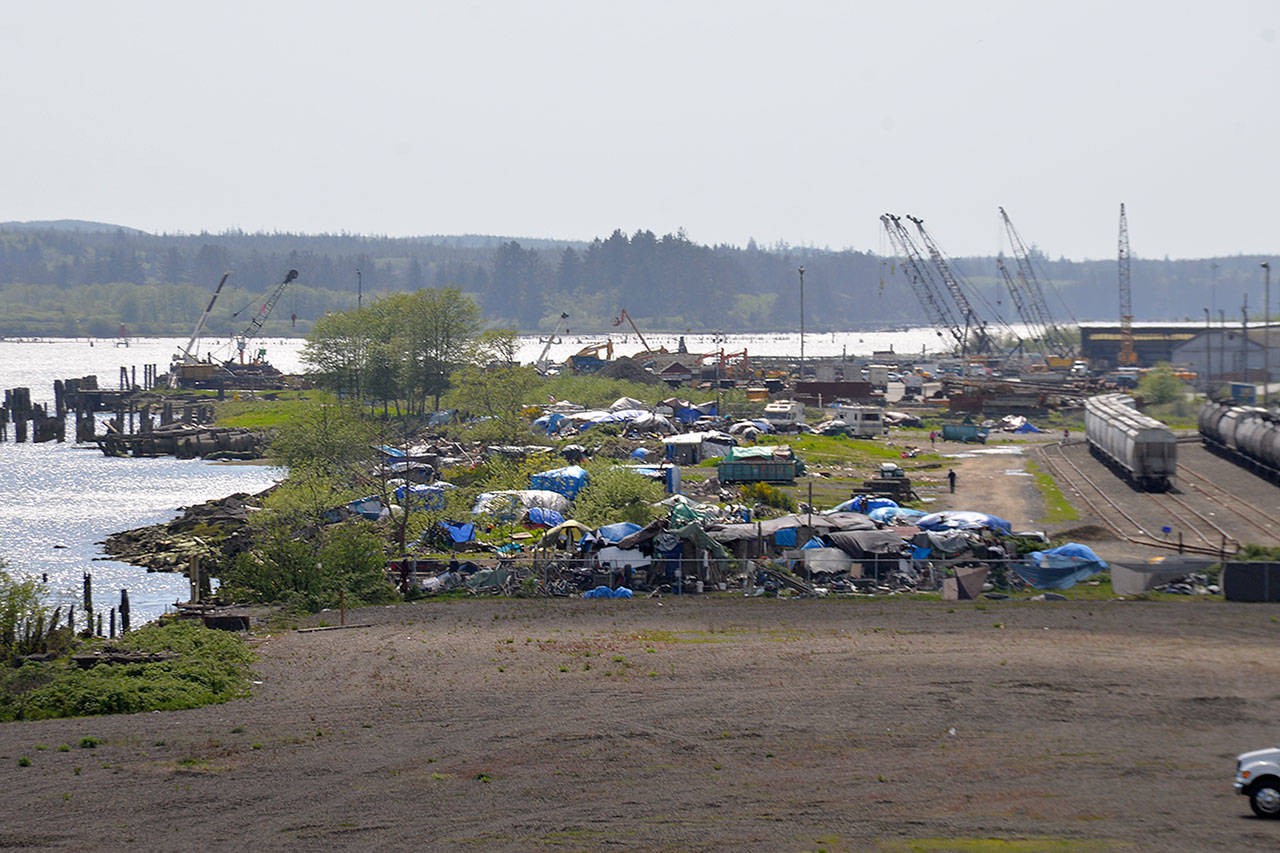Another federal lawsuit has been filed against the City of Aberdeen over its dealing with the homeless population. This time it’s an attempt to stop Mayor Erik Larson’s proposal for an ordinance that would clear the city’s major homeless encampment along the Chehalis River.
The lawsuit was filed Monday in U.S. District Court in Tacoma, and asks for an injunction to prevent the city from moving the many people living in tents, shacks and vehicles along the river unless alternative shelter is provided for them. It was filed by eight people currently living along the river, along with the Rev. Sarah Monroe and Apryl Boling who were both plaintiffs in an earlier lawsuit to stop the city’s permit system for visitors to the homeless camp. They were successful in changing the policy and won court costs.
Mayor Larson declined to comment on the latest lawsuit, simply saying he has “no comment on pending litigation.” City Council President Tawni Andrews declined to comment Wednesday afternoon, saying she needed some time to read through the lawsuit first.
The City of Aberdeen owns the property occupied by the homeless camp, which is a thin strip of land between the river and the multiple train tracks near downtown. The city bought it for $295,000 last year with the intention of evicting people off the property, Larson has said. He believes the property is unsafe and unfit for habitation, citing previous accidents with people crossing the train tracks. One woman lost her legs after getting caught under a train.
The ordinance would “prohibit all public access” to the riverfront property, meaning all the people living on it would be forced to leave and not allowed to live there. Larson has refrained from discussing the specifics of how he thinks people would be moved, citing the potential for litigation as part of the reason he doesn’t want to discuss it.
The council passed the first reading of the ordinance April 10. Ordinances have a three-step process. This one would take effect immediately on passage. The council voted 10 in favor of the ordinance to clear the camp, one against and one who abstained.
It was scheduled to consider a second reading Wednesday night.
Last fall, 108 people were registered by the city as living down at the city-owned property. The mayor reported that the number of people has been cut in half at a recent public meeting for city leaders, but staff at the homeless assistance group Revival of Grays Harbor say it’s still over 100 people there.
This ordinance comes not long after Monroe, Boling and businessman Tim Quigg filed a federal lawsuit in November to stop the city’s controversial permit system that prevented anyone from visiting the riverfront property without a permit. The federal judge Robert B. Leighton sided with the homeless advocates, and led to the city throwing out the permit system for less stringent restrictions and 8 a.m. to 8 p.m. visiting hours.
The latest lawsuit requests an injunction to prevent the city from evicting homeless people from the riverfront if the city does pass the ordinance. And it asks for compensatory damages if the city does go through with evictions.
The lawsuit’s “prayer for relief” section also asks that several city codes restricting public camping be deemed unconstitutional as applied to the homeless. These include the city’s policy that it’s unlawful for people to “camp or use camp paraphernalia” in public parks unless authorized, public streets, sidewalks, or other improved public rights-of-way, and in “public owned or maintained parking lots or other publicly owned or maintained areas.” The city code also says it’s unlawful for people to occupy a vehicle for the purpose of camping while it’s parked in the previously mentioned public spaces.
The suit also targets the city’s prohibition to place objects in the city’s streets or on sidewalks that obstruct “the free use and passage thereof” without obtaining a permit from the city, and that it’s the “special duty” of the city’s street commissioner and staff to see the street restrictions are “strictly enforced” and to cause the arrest of any person violating them.
In January, the city amended the city code in an attempt to better comply with last September’s U.S. Court of Appeals decision “Martin v. Boise,” in which the courts deemed that Boise’s restrictions to public sleeping and camping were unconstitutional in circumstances in which homeless people had nowhere else to go.
The amendment by Aberdeen added some strictness to the public camping restrictions, saying they shall be enforced at all times, but also attempted to comply with the Boise decision by saying the camping restrictions on street right-of-ways will not be enforced when there is no overnight shelter available for those homeless people, and reducing public camping violations from a misdemeanor to a civil infraction.
The city also restricted people living on the streets with an ordinance a year ago that prohibits sitting and lying down on the city’s downtown improvement district between 6 a.m. and 11 p.m.
After the April 10 council meeting, Larson asserted that it’s not illegal to be homeless in the city, as some suggest, and said there are places homeless people can live, such as city right of ways, sidewalks and other spaces. He didn’t respond to questions about the ordinances targeted by the lawsuit that seem to prevent camping in those public spaces.
If the city council accepts the second reading of the ordinance at the Wednesday meeting, which also includes a public hearing on the ordinance, it will only require one more vote at the next meeting May 8 to finalize it.
This story originally appeared in the Aberdeen Daily World, a sibling paper to the Herald.
Talk to us
> Give us your news tips.
> Send us a letter to the editor.
> More Herald contact information.

























